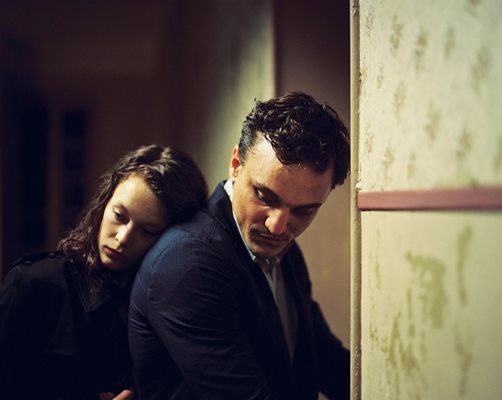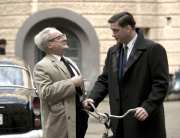“Georg? Are you still here?” The first line of Christian Petzold’s Transit could echo throughout the film, an enigmatic study of living in limbo on the way to somewhere else. Petzold has directed taut stories of surveillance, entrapment, and submission to the forces of capitalism and state power, but Transit takes a more roundabout way than those polished works. In setting the tale in a modern but out-of-time era, the director has removed the period specificities that made films like the Communist-era Barbara so powerful in favor of an evocation of the hurry-up-and wait experience of those stranded by fate.
That first line is uttered in a bar to Georg (Franz Rogowski, resembling the young Joaquin Phoenix), a young man on the run from fascists hunting Jews. The Holocaust is taking place, only in what looks like contemporary Paris. He’s about to flee the city, but the speaker of the aforementioned line wants Georg to take two important letters to a dissident writer at a hotel. He does so, and in the hotel room, Georg finds the bloody remains of a suicide, but he keeps the letters; these and other documents taken from the dead man will later be the key to an improvised new identity. After a flight from Nazis through Parisian streets, Georg stows away on board a train for Marseille along with an injured fellow fugitive, whose cries of pain express a level of real suffering the film tends to glance away from most of the time.
Georg arrives in Marseille, a city oddly uncrowded, unhurried, and certainly cleaned up as never before in recent history. There he forms a rapport with a Maghrebi boy (Lilien Batman) and his mother (Maryam Zaree), who is deaf and mute. Her presence may be—but may not be—a reference to Europe’s current refugee debacle. Meanwhile, he takes a seat in a queue of well-behaved fellow exit-seekers at the Mexican consulate, where he impersonates the dead man and obtains a coveted passage on a ship leaving port. He also exchanges glances with a mystery woman (Paula Beer), who will become important down the line, but just how?
Their relationship will gradually unfold, but in the meantime Transit can feel like the most languorous refugee experience ever put on film. The milieu here does not feel like a land under siege where people on the run are desperate to leave. Instead, it is an art-house never-neverland where a deaf woman begs a stranger to sing a lullaby, a visa applicant and a consul exchange arch dialogue on writing and school days, strangers have time for meandering conversations, and going-nowhere lovers share sweet hand holding and banjo eyes in cafes. A voice-over throughout intones in German remarks such as “Then he returned to the hotel, to his own loneliness,” as we see George glumly walking up a flight of stairs. Where is the Christian Petzold of tough heroines, sharp edits, and real but dangerously heightened stakes?
That director briefly reappears in Transit’s last fifth, where mounting losses sow fear and disorientation, a secret extracts a high price, and Georg commits an act of impulsive heroism as the enemy closes in. It shakes loose of the previous precious ennui, and it comes just in time. Transit closes on a note of despair, or is there hope? Either emotion comes as a bracing corrective to the becalmed state that has come before and brings a Petzold film abruptly back to form.

















Leave A Comment